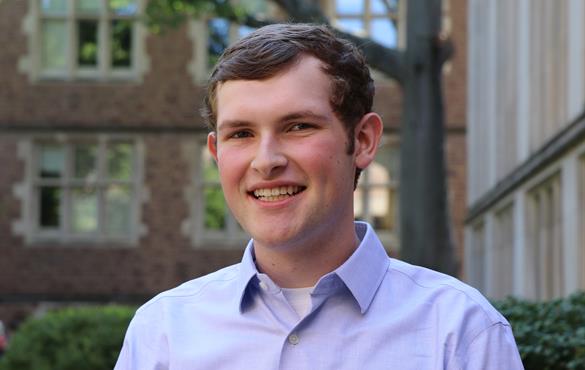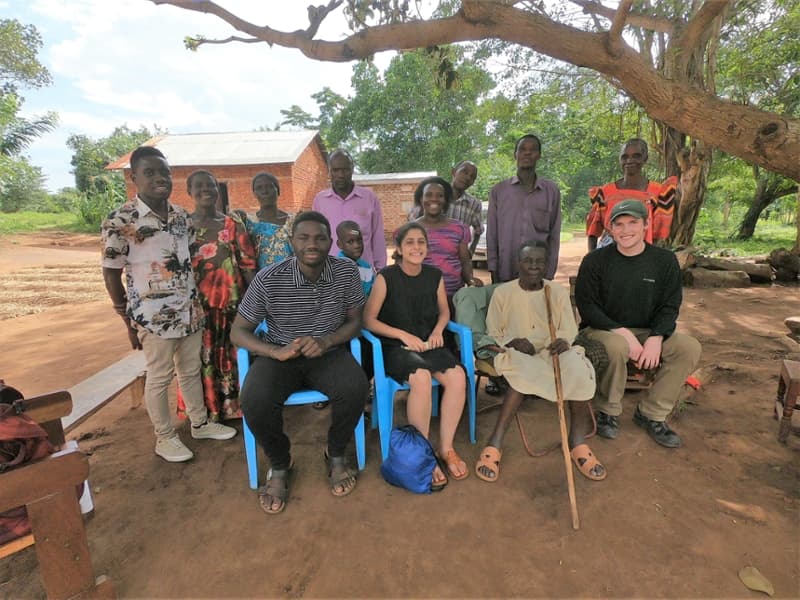Nicholson travels to Ethiopia, Uganda for EWB

Why did you decide to attend WashU?
I initially decided to apply to WashU after hearing about the abundance of research opportunities at the nearby medical school. Having decided that I wanted to pursue biomedical engineering to combine my interests in biology and engineering with a passion for service, I thought that WashU would be a great fit. As I looked into what else WashU had to offer, I discovered an abundance of service groups on campus, a collaborative student work environment and incredible support through faculty and Engineering Student Services. After being accepted, I received the Ishida-Stout Scholarship which made WashU financially feasible and allowed me to focus on extracurricular activities. I was unable to find similar financial and individual support at the other universities I had applied to.
I knew that I wanted to get involved with Engineers Without Borders after my initial research on the student groups at WashU. Their work at the time with medical devices in Guatemala was intriguing, and I was eager to begin seeing the effect of medical equipment on improving patient care. After learning about the opportunities I had as a first year student, I was hooked! Since then, I have maintained my enthusiasm for the chapter through a growing interest in sustainable development, improving my professional skillset and passion for using the resources at my disposal to help others.
Describe the project you worked on over the summer and your experience at the Mekelle School.
Over the summer I helped to conduct an evaluation of our chapter’s work at the Mekelle School for the Blind in Mekelle, Ethiopia. Our previous projects helped the school construct a water tower, improve the distribution of potable water across campus, enhance the electrical system and provide adequate drainage under the school’s foot bridge. During our week-long evaluation, our team of two students and two professionals interviewed staff and students, conducted site surveys, and visited with contributing community members. All of our activities built on our confidence leaving the community to maintain and expand upon the projects we helped them complete. The students and staff at the school were incredibly welcoming, and some students recognized Kara Todd, the other student involved, from her work on the project two years ago.
After visiting the school in Mekelle, I traveled to Uganda where I worked on building our next partnership. After starting our partnership in Nicaragua and observing what worked well with our partnerships in Ethiopia and Guatemala, I wanted to build a partnership that could allow us to make a larger impact. Shanti Parikh (associate professor of anthropology in Arts & Sciences) was my faculty fellow in Eliot Residential College and invited me to follow her research team to the city of Iganga, Uganda. During my two weeks in Iganga, I met with a variety of different NGOs, community-based organizations, schools, district engineering staff, and the mayor to identify possible projects and learn from other successful interventions and engineering solutions. I intend to return with our chapter this summer to formalize a partnership with a primary school where we will improve the students access to latrines (currently, each student shares a pit latrine with 200 peers), clean water and reliable electricity.

How has your involvement with EWB and working on engineering projects impacted your experience as a student?
Engineers Without Borders projects have connected me to some of my peer mentors, successful alumni and university faculty I wouldn’t have otherwise been able to meet. In addition to the wealth of information and support they provide, they frequently tell me that the lessons I have learned through EWB will be the best preparation I receive for a future career. Engineers Without Borders has also motivated me through seeing how the ideas of WashU students can help solve some of the world’s most pressing problems.
What are your future plans after graduation?
I am currently deciding between pursuing graduate school or an industry job. I am hoping that an internship in the medical devices industry the summer before my senior year will give me the experience needed to make this decision.
What’s one piece of advice you would give a first-year student?
Find something at WashU that you are passionate about. Your time is incredibly valuable, so pursue something that you are truly invested in. My passion for service and skiing has helped shape my experience at WashU and motivate me to get through long nights spent studying in the library.
